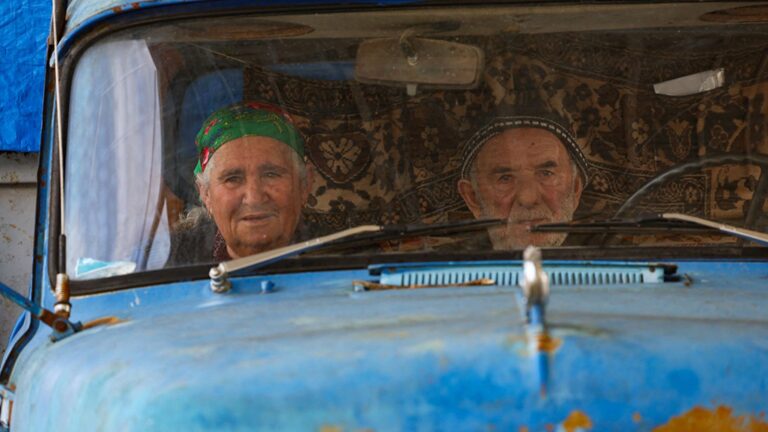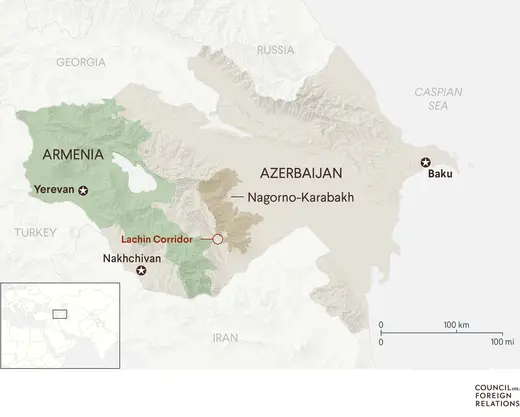The ethnic Armenians of Azerbaijan’s Nagorno-Karabakh enclave, a Christian-majority community in a Muslim-majority nation, are experiencing rapid ethnic cleansing. Last week, almost all of the estimated 120,000 Armenians living in Nagorno-Karabakh fled west to Armenia. The spill follows clashes with Azerbaijani forces that reportedly left more than 400 people dead, including some civilians. The new conflict marks the failure of years of diplomatic efforts to stop the persecution of Armenians, leaving limited options to address the situation through international law.
What is ethnic cleansing?
More from our experts
The Armenian government has accused Azerbaijan of ethnic cleansing in Nagorno-Karabakh. Although the term “ethnic cleansing” has been given various definitions over the years, the United Nations defines it as “the act of killing one ethnic group to eliminate civilians of another ethnic or religious group by violent and terrorist-inducing means.” or deliberate policies planned by religious groups.” from a specific geographic region. ” Starvation tactics used against Armenians when the so-called Lachin Corridor between Nagorno-Karabakh and Armenia was closed for months, combined with intimidation by the Azerbaijani army, led to an exodus of Armenians and triggered charges of ethnic cleansing. It became.
detail:
armenia
Azerbaijan
Nagorno Karabakh
International law
human rights
Ethnic cleansing is not defined as a matter of criminal law, but its nature appears as a prerequisite for crimes against humanity in the form of persecution and acts of genocide. The International Criminal Court prosecutes these atrocious crimes, and many such cases center on allegations of ethnic cleansing. The most notable example of ethnic cleansing in the past few decades was the forced expulsion of the Muslim Bosniak population of Bosnia and Herzegovina by Bosnian Serb (Orthodox) and Bosnian Croat (Roman Catholic) forces in the early 1990s. Met.
Explicit references to ethnic cleansing can also be found in the Responsibility to Protect (R2P) Principles, adopted unanimously by the United Nations General Assembly in 2005. R2P states that countries commit “genocide, crimes against humanity, ethnic cleansing and war crimes.” But if governments fail to do so, the UN Security Council can use coercive powers under the UN Charter to punish civilians. R2P declares that such assaults on people can be prevented and combated. The Security Council is not acting on an R2P basis in the current Nagorno-Karabakh crisis. Because Russia, as one of the five veto-wielding permanent members, will almost certainly block such action while Russia remains focused on waging a war of aggression against Nagorno-Karabakh. It is. Ukraine.
Is there a role for international monitors?
In Nagorno-Karabakh, deterrence, including measures that could prevent ethnic cleansing, has reached its expiration date. It is now too late for international observers to testify to the fate of ethnic Armenians in Nagorno-Karabakh. A UN monitoring mission that arrived in the enclave confirmed that almost all Armenians had already taken refuge in Armenia.
More from our experts
The history of surveillance in the region is mixed. Russia sent peacekeeping forces to Nagorno-Karabakh after the conflict over the enclave flared up again in 2020, but this is an extension of the smaller observation group sent by the Organization for Security and Co-operation in Europe (OSCE) several years ago. It is a reproduction of. The Russian military, which normally functions as a de facto surveillance mission, proved to be extremely ineffective. It has refused to intervene to open the Lachin Corridor and has failed to prevent new attacks on the enclave.
However, another possibility is the deployment of OSCE or UN observers on a new mission to patrol the Armenia-Azerbaijan border in hopes of preventing cross-border movement by both countries’ militaries. Conceivable. This approach should include a negotiated withdrawal of Azerbaijani forces from occupied Armenian territory in 2021 and 2022 and a return to internationally recognized borders. If this idea proves unworkable, the two countries could agree to take the dispute to the International Court of Justice for adjudication.
detail:
armenia
Azerbaijan
Nagorno Karabakh
International law
human rights
Does Azerbaijan have a responsibility to protect Armenians?
Azerbaijan insists it treats the remaining Armenians in Nagorno-Karabakh like any other ethnic minority. This promise will not give much confidence to the Armenian minority, who currently face the prospect of Baku taking control of the governance of Nagorno-Karabakh.
Azerbaijan is party to several multilateral treaties that contain obligations that explicitly protect or reflect the rights of ethnic minorities. OSCE High Commissioner for Ethnic Minorities Kairat Abdullahmanov may step up monitoring of Azerbaijan’s compliance with and violations of the European Convention on Human Rights, the Framework Convention for the Protection of Ethnic Minorities, and the International Covenant on Civil and Political Rights . Aggrieved Armenians can file a complaint against Azerbaijan with the European Court of Human Rights, a legal arm of the Council of Europe, a human rights body to which both Armenia and Azerbaijan belong.
To show respect for R2P, Azerbaijan should stop ethnic cleansing, including incitement against Armenians. Although it may be unthinkable given what happened in Nagorno-Karabakh, the United Nations and influential actors such as the United States, Turkey, and the European Union should be on point in all diplomatic interactions with Baku.
Should we establish a truth and reconciliation commission?
There is long-standing animosity between Nagorno-Karabakh’s ethnic Armenians and Azerbaijan’s Muslim majority, and resentment was heightened by the brutal war and subsequent Armenian occupation of the enclave and surrounding Azerbaijani areas in the early 1990s. ing. The resulting recent armed conflict and rout that drove most of the Armenians into Armenian territory requires some kind of dialogue. Otherwise, resentment and insecurity will govern the future relations between Azerbaijan and Armenia.
As a start, the Council of Europe should consider establishing a truth and reconciliation commission that brings together both government officials and the public to address grievances and aspirations. The fate of Nagorno-Karabakh as a territory is now irreversible. Nagorno-Karabakh will be absorbed into the nation-state of Azerbaijan. However, Armenians who call Nagorno-Karabakh home will still seek an end to persecution and hatred. Respect and dignity are the pillars of the Truth and Reconciliation Commission. Armenia and Azerbaijan should strive to restore their peoples, starting with efforts to seek the truth and create momentum to reconcile divisive prejudices. Nor does there have to be a trade-off between justice and transparency, as the case of post-civil war Sierra Leone has proven. Because both can balance themselves in the outcome.
What about the International Criminal Court (ICC)?
One approach to justice would be to rely on the International Criminal Court (ICC), which can investigate and prosecute charges such as ethnic cleansing. On October 3, the Armenian Parliament ratified the ICC Rome Statute and is expected to become a party two months after the formal deposit of its ratification instrument (possibly in early December 2023). The news was not welcomed by Russia, Armenia’s long-time (now defunct) ally. Russian leader Vladimir Putin has been indicted by the ICC for war crimes in Ukraine and could be arrested if he visits Armenia. Azerbaijan remains a non-party to the court.
Armenia’s support for the ICC could be a powerful weapon in court. In fact, even before it was officially 124.th As a member state of the ICC, Armenia can immediately submit a special “Article 12(3)” declaration giving the court jurisdiction over the forced return of Armenians from Nagorno-Karabakh to Armenian territory. This option would be similar to the ICC’s current jurisdiction over atrocity crimes committed on Ukrainian territory (a non-state party). Ukraine filed two such declarations, which led to an official ICC investigation into the situation in Ukraine (and Russian officials). The investigation was launched following inquiries from a number of her ICC countries. A similar progression may be appropriate for Armenia’s injuries in the Nagorno-Karabakh situation. If Armenia’s status at the ICC is resolved, Azerbaijan’s political and military leaders may be brought under the jurisdiction of the ICC, similar to the forced return of the Rohingya minority to ICC territory (ethnic cleansing). In 2017, member state Bangladesh exposed Myanmar authorities to an ICC investigation by the Myanmar (non-ICC member state) military.
Baku wants to take advantage of Nagorno-Karabakh’s declining population by deploying swift military action across Armenian territory to control access to Nakhchivan, an Azerbaijani enclave that borders Iran. Maybe. But now, as Armenia prepares to join the ICC, Azerbaijan’s political and military leaders are likely to risk being investigated for crimes of aggression by the ICC prosecutor. This may explain the rapid movement of the Armenian parliament to ratify the Rome Statute, not only to address the fate of the Armenian people, but also to stop Azerbaijan’s aggression throughout its territory.

